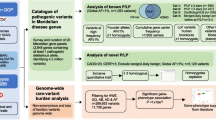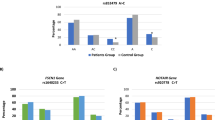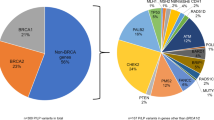Abstract
Many studies were published to evaluate the association between Nijmegen breakage syndrome 1 (NBS1) 657del5 polymorphism and breast cancer risk, but the results remained inconsistent. To derive a more precise estimation on the possible association, we performed a meta-analysis of previous published studies. Case–control studies on the association between NBS1 657del5 polymorphisms and breast cancer risk were included into this meta-analysis. We used the odds ratio (OR) with 95 % confidence interval (95 % CI) to assess the strength of the association. Ten studies with a total of 25,365 subjects were identified and included into this meta-analysis. Meta-analysis of those ten studies showed that there was a significant association between NBS1 657del5 polymorphisms and breast cancer risk (pooled OR = 2.66, 95 % CI 1.82–3.90, P < 0.001). The cumulative meta-analyses showed a trend of a more significant association between NBS1 657del5 polymorphisms and breast cancer risk as data accumulated by publication year. Thus, our meta-analysis suggests that there was a significant association between NBS1 657del5 polymorphisms and breast cancer risk, and NBS1 657del5 polymorphism results in an increased risk of breast cancer.



Similar content being viewed by others
References
Cuzick J, DeCensi A, Arun B, Brown PH, Castiglione M, Dunn B, et al. Preventive therapy for breast cancer: a consensus statement. Lancet Oncol. 2011;12:496–503.
Higgins MJ, Baselga J. Breast cancer in 2010: novel targets and therapies for a personalized approach. Nat Rev Clin Oncol. 2011;8:65–6.
Foulkes WD, Smith IE, Reis-Filho JS. Triple-negative breast cancer. N Engl J Med. 2010;363:1938–48.
Reis-Filho JS, Pusztai L. Gene expression profiling in breast cancer: classification, prognostication, and prediction. Lancet. 2011;378:1812–23.
Tauchi H, Matsuura S, Kobayashi J, Sakamoto S, Komatsu K. Nijmegen breakage syndrome gene, NBS1, and molecular links to factors for genome stability. Oncogene. 2002;21:8967–80.
Huang J, Grotzer MA, Watanabe T, Hewer E, Pietsch T, Rutkowski S, et al. Mutations in the Nijmegen breakage syndrome gene in medulloblastomas. Clin Cancer Res. 2008;14:4053–8.
Maser RS, Zinkel R, Petrini JH. An alternative mode of translation permits production of a variant NBS1 protein from the common Nijmegen breakage syndrome allele. Nat Genet. 2001;27:417–21.
Carlomagno F, Chang-Claude J, Dunning AM, Ponder BA. Determination of the frequency of the common 657del5 Nijmegen breakage syndrome mutation in the German population: no association with risk of breast cancer. Genes Chromosomes Cancer. 1999;25:393–5.
Gorski B, Debniak T, Masojc B, Mierzejewski M, Medrek K, Cybulski C, et al. Germline 657del5 mutation in the NBS1 gene in breast cancer patients. Int J Cancer. 2003;106:379–81.
Buslov KG, Iyevleva AG, Chekmariova EV, Suspitsin EN, Togo AV, Kuligina E, et al. NBS1 657del5 mutation may contribute only to a limited fraction of breast cancer cases in Russia. Int J Cancer. 2005;114:585–9.
Gorski B, Cybulski C, Huzarski T, Byrski T, Gronwald J, Jakubowska A, et al. Breast cancer predisposing alleles in Poland. Breast Cancer Res Treat. 2005;92:19–24.
Kanka C, Brozek I, Skalska B, Siemiatkowska A, Limon J. Germline NBS1 mutations in families with aggregation of breast and/or ovarian cancer from north-east Poland. Anticancer Res. 2007;27:3015–8.
Roznowski K, Januszkiewicz-Lewandowska D, Mosor M, Pernak M, Litwiniuk M, Nowak J. I171V germline mutation in the NBS1 gene significantly increases risk of breast cancer. Breast Cancer Res Treat. 2008;110:343–8.
Mateju M, Kleiblova P, Kleibl Z, Janatova M, Soukupova J, Ticha I, et al. Germline mutations 657del5 and 643C>T (R215W) in NBN are not likely to be associated with increased risk of breast cancer in Czech women. Breast Cancer Res Treat. 2012;133:809–11.
Mantel N, Haenszel W. Statistical aspects of the analysis of data from retrospective studies of disease. J Natl Cancer Inst. 1959;22:719–48.
Doubilet P, Weinstein MC, McNeil BJ. Use and misuse of the term “cost effective” in medicine. N Engl J Med. 1986;314:253–6.
Zintzaras E, Lau J. Synthesis of genetic association studies for pertinent gene–disease associations requires appropriate methodological and statistical approaches. J Clin Epidemiol. 2008;61:634–45.
Muellerleile P, Mullen B. Sufficiency and stability of evidence for public health interventions using cumulative meta-analysis. Am J Public Health. 2006;96:515–22.
Egger M, Davey Smith G, Schneider M, Minder C. Bias in meta-analysis detected by a simple, graphical test. BMJ. 1997;315:629–34.
Steffen J, Varon R, Mosor M, Maneva G, Maurer M, Stumm M, et al. Increased cancer risk of heterozygotes with NBS1 germline mutations in Poland. Int J Cancer. 2004;111:67–71.
Steffen J, Nowakowska D, Niwinska A, Czapczak D, Kluska A, Piatkowska M, et al. Germline mutations 657del5 of the NBS1 gene contribute significantly to the incidence of breast cancer in Central Poland. Int J Cancer. 2006;119:472–5.
Bogdanova N, Feshchenko S, Schurmann P, Waltes R, Wieland B, Hillemanns P, et al. Nijmegen breakage syndrome mutations and risk of breast cancer. Int J Cancer. 2008;122:802–6.
Zhang Y, Zhou J, Lim CU. The role of NBS1 in DNA double strand break repair, telomere stability, and cell cycle checkpoint control. Cell Res. 2006;16:45–54.
Thompson LH. Recognition, signaling, and repair of DNA double-strand breaks produced by ionizing radiation in mammalian cells: the molecular choreography. Mutat Res. 2012;751:158–246.
Kondratenko I, Paschenko O, Polyakov A, Bologov A. Nijmegen breakage syndrome. Adv Exp Med Biol. 2007;601:61–7.
van der Groep P, van der Wall E, van Diest PJ. Pathology of hereditary breast cancer. Cell Oncol (Dordr). 2011;34:71–88.
Dodson GE, Limbo O, Nieto D, Russell P. Phosphorylation-regulated binding of CTP1 to NBS1 is critical for repair of DNA double-strand breaks. Cell Cycle. 2010;9:1516–22.
Conflicts of interest
None of the authors have any conflict of interests to declare.
Author information
Authors and Affiliations
Corresponding author
Additional information
Guofeng Zhang and Yu Zeng contributed equally to this work.
Rights and permissions
About this article
Cite this article
Zhang, G., Zeng, Y., Liu, Z. et al. Significant association between Nijmegen breakage syndrome 1 657del5 polymorphism and breast cancer risk. Tumor Biol. 34, 2753–2757 (2013). https://doi.org/10.1007/s13277-013-0830-z
Received:
Accepted:
Published:
Issue Date:
DOI: https://doi.org/10.1007/s13277-013-0830-z




